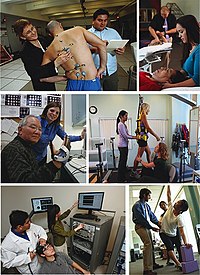
Photo from wikipedia
RATIONALE In the last decades, length of stay of in-hospital rehabilitation of patients with stroke has been significantly reduced. Health authorities expect relatives to be at disposal to convey the… Click to show full abstract
RATIONALE In the last decades, length of stay of in-hospital rehabilitation of patients with stroke has been significantly reduced. Health authorities expect relatives to be at disposal to convey the knowledge of everyday life and to provide emotional as well as practical support in relation to the patient. Caregivers require nurse assistance, support and to be seen as an essential partner in the care giving process. However, the nurses do not perceive that teaching of relatives is a task they should routinely undertake. This might indicate an ambiguity between the relatives' expectations and the actual contribution from nurses. AIM This study describes nurses' experienced roles and functions addressing the relatives of patients with stroke during in-hospital rehabilitation. METHODOLOGICAL DESIGN A phenomenological hermeneutic approach influenced by Paul Ricoeur. In a secondary analysis focus group, interviews of 19 randomly selected nurses from three different hospital settings were interpreted in three levels. The study was conducted in accordance with the ethical guidelines for nursing research in the Nordic countries. FINDINGS The nurses expressed that they address the patient and the relatives and support the interaction between the patient and the relatives. Four themes occurred: the changed lives of relatives; shared life after stroke; noncooperating relatives; time for the relatives. CONCLUSION Nurses experience their roles and functions addressing relatives after stroke as crucial, challenging and multifaceted. They acknowledged care needs of the relatives in their own right by addressing the relatives' vulnerability during in-hospital rehabilitation characterised by an existential threat to the physical as well as the shared life. The focus on the needs of relatives considering their expected future role was experienced as conflicting with restricting time frames and a healthcare system focusing on the individual patient.
Journal Title: Scandinavian Journal of Caring Sciences
Year Published: 2018
Link to full text (if available)
Share on Social Media: Sign Up to like & get
recommendations!